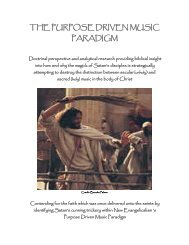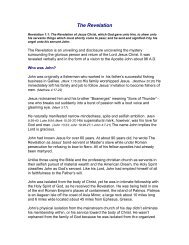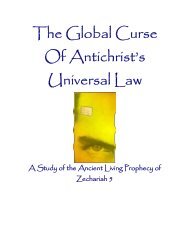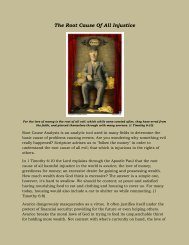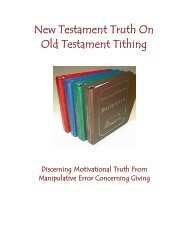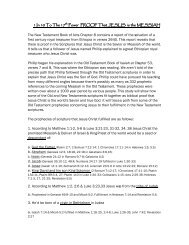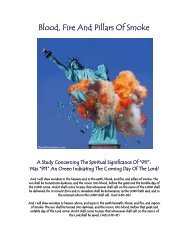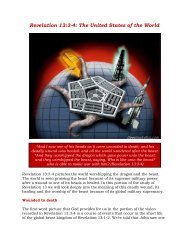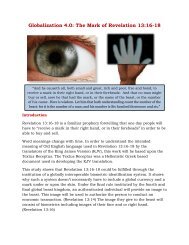Mystery, Babylon The Great (2005) - Escape Babylon's Demons
Mystery, Babylon The Great (2005) - Escape Babylon's Demons
Mystery, Babylon The Great (2005) - Escape Babylon's Demons
Create successful ePaper yourself
Turn your PDF publications into a flip-book with our unique Google optimized e-Paper software.
CHAPTER 2<br />
<strong>The</strong> women: <strong>Great</strong> nation at the time of the vision?<br />
<strong>The</strong> next two questions to address in determining the mystery of who <strong>Babylon</strong> the<br />
<strong>Great</strong> is concerns the timing of John’s vision.<br />
Was the angel showing John a vision of the great Roman Empire that ruled over<br />
the world at the time of the vision?<br />
Or was the angel showing John a vision of a future great city or superpower<br />
nation-state like the U.S.?<br />
Revelation 17:18 says:<br />
“And the woman which thou sawest is that great city, which reigneth over the kings of the earth.”<br />
<strong>The</strong> verb “is” used above in Greek is estin. Estin is a third person, present tense,<br />
active voice, indicative mood parsing of the root verb eimi meaning “to be“. In other<br />
words, the great city is reigning. Revelation 17:18 could be accurately paraphrased<br />
as follows:<br />
“And the woman which thou sawest is that great city, which is reigning over the kings of the earth.”<br />
For the following reasons one can conclude that the vision is of a future superpower<br />
nation-state.<br />
<strong>The</strong> whole vision is in the context of the future.<br />
<strong>The</strong> angel is showing John a future vision. Verse 18 is part of that future vision. You<br />
have to violate grammatical rules and remove verse 18 from it’s future context in<br />
order to say that the verse is speaking about 1 st century Rome at the present time of<br />
the vision.<br />
“Is” mean equals in Revelation 17:18.<br />
“And the woman which thou sawest is that great city, which reigneth over the kings of the earth.”<br />
After all, we can say “6 + 6 equals 12” or “6 + 6 is 12“. <strong>The</strong> Bauer-Arndt-Gingrich &<br />
Danker Greek Lexicon comments that one of the ways this word “is” is to be<br />
considered is explanatory, a representation or an equivalent of after verbs of asking,



